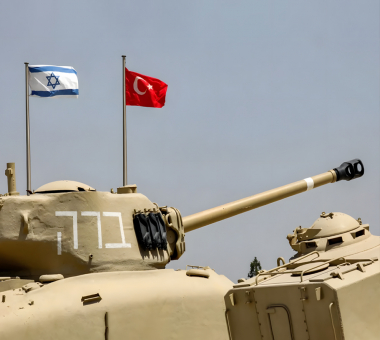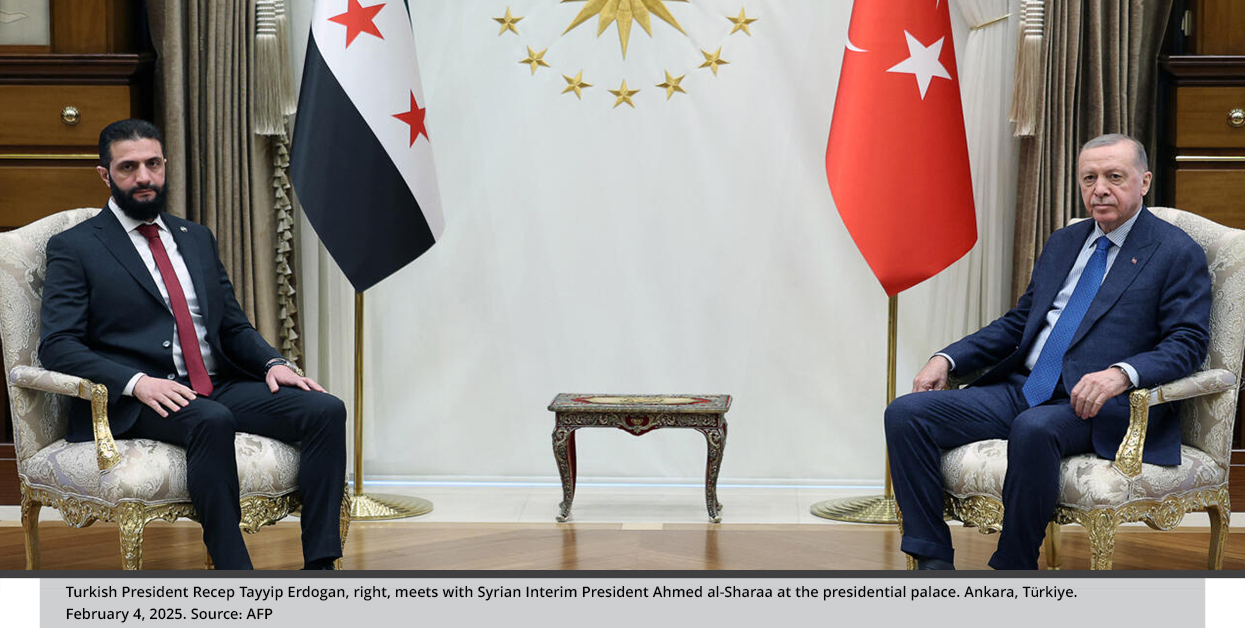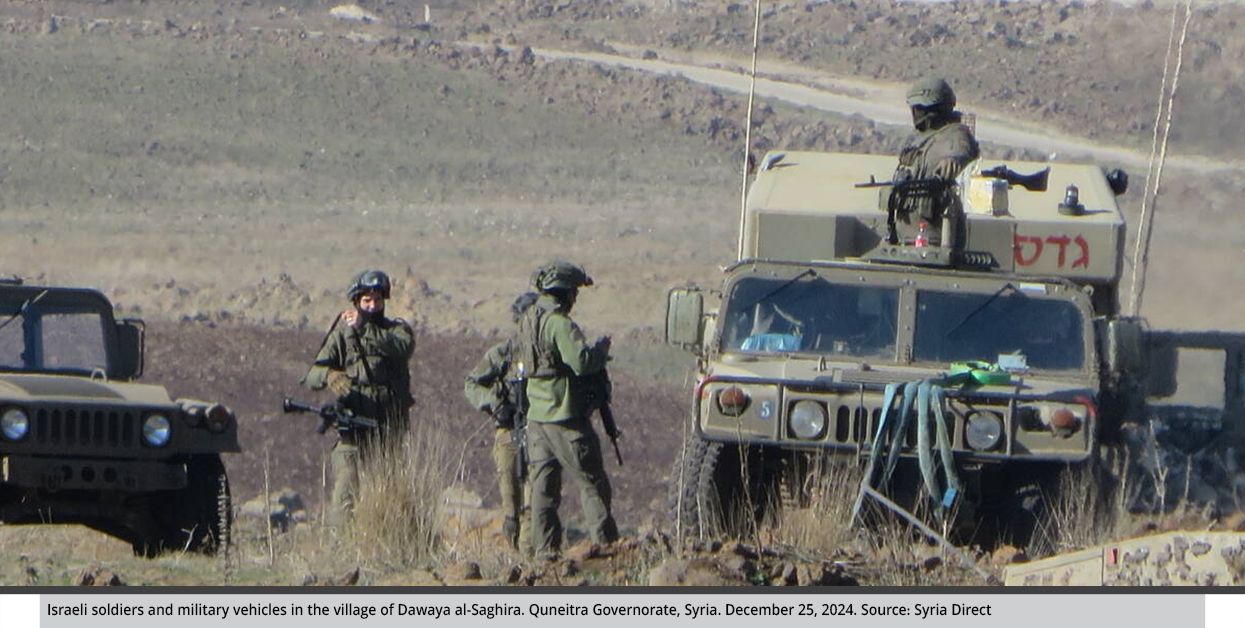The Syrian Geopolitical Scene Amid Israeli–Turkish Rivalry
The Syrian arena is witnessing an escalation in the Israeli–Turkish rivalry, driven by their divergent visions for the structure of the new power following the regime change in December 2024. While Türkiye rushed to support the transitional government and solidify its influence, Israel viewed the rise of Turkish-backed Salafist factions as a threat to its national security and to the regional balance of power. This reflects Syria’s transformation into a central arena for shaping the new Middle East order, though the rivalry remains within a “managed” framework.
by STRATEGIECS Team
- Release Date – Jul 6, 2025

This opinion article is part of the series: Syria.. Transformations, Variables, and the Future of the State of Uncertainty
Israeli–Turkish relations have undergone a clear shift toward rivalry in the Syrian arena since the regime change on December 8, 2024. Previously, their shared opposition to the former regime served as a basis for tactical rapprochement and temporary mutual interests. However, deep differences in their approaches to the structure of the new ruling authority, their preferred model for governance in Syria, and their contrasting visions of Syria’s geographic role in the evolving regional balance have all contributed to rising tensions between them. As a result, Syria is becoming a geo-strategic battleground between two powers competing to solidify their influence. This competition could have direct implications for the country’s political, security, and even social future.
Syrian Geography: Shifting Roles and Changing Actors
The fall of the former regime and the rise of armed opposition forces marked a fundamental shift in the landscape of actors involved in Syrian affairs, producing a shifting matrix of interests and rivalries that ranged from new gains and opportunities to mounting challenges and fears. These transformations began with the launch of the “Deterrence of Aggression” operation by Hay’at Tahrir al-Sham (HTS) and allied factions on November 27, 2024, culminating in the regime’s overthrow on December 8, less than two weeks later.
A range of interconnected factors broke the long-standing stalemate that had persisted since 2018. Chief among them was Türkiye’s support and coordination with the opposition forces, which gave crucial momentum to the offensive—and likely even during its preparation phase—evidenced by Türkiye’s military build-up beginning in October 2024. This included convoys of military vehicles, troop carriers, logistical reinforcements, air defense systems, and radar equipment, coinciding with visits by high-level military officials, including that of the commander of Turkish land forces to bases in northern Syria.
These developments were indirectly facilitated by the unfolding war in Gaza, which diverted regional attention and thus enabled opposition forces to act more freely. During this time, Israel expanded its operations to degrade Hezbollah’s capabilities in Lebanon and Syria, targeting its leadership structure and the military-intelligence infrastructure of Iran’s Islamic Revolutionary Guard Corps in Syria. These operations dealt a severe blow to the former regime, stripping it of the pillars that had ensured its continuity, especially as Russia shifted its strategic focus increasingly toward Ukraine after 2022, following a period of decisive influence in Syria through military interventions and political mediation since 2015.
The most immediate and consequential result of the regime’s fall was the emergence of a significant vacuum not only in governance but also in the strategic utility and positioning of Syrian geography. This came as the roles of Russia and Iran diminished—both of which had been key players in managing local power dynamics and in leveraging Syria for broader strategic ends: whether as a staging ground for Russian geopolitical ambitions or as a core component of Iran’s “Axis of Resistance.” Consequently, both Türkiye and Israel—each having directly or indirectly contributed to the regime change—moved quickly to steer the future orientation of Syria’s geography. Their respective goals ranged from advancing geopolitical interests to preempting emerging threats.
The Shifting Matrix of Interests and Challenges
The ongoing transformations in Syria have generated a multifaceted divergence between Türkiye and Israel, reflected in their contrasting positions toward the new ruling authority, their visions for Syria’s future governance model, their relationships with local actors, and their differing interpretations of emerging interests and threats. What one side views as an opportunity is perceived by the other as a direct threat.
Türkiye, for its part, was quick to declare its support for the transitional government and move toward an alliance with it, dispatching high-level political and security delegations to Damascus and expressing interest in developing defense partnerships. These included the deployment of ground and air forces, as well as air defense systems on Syrian territory. Ankara also laid out a set of guiding principles for its policy, chief among them a rejection of any form of decentralization that could grant the Kurds autonomous rule.
Moreover, Türkiye played a pivotal role alongside Saudi Arabia and Jordan in solidifying Syria’s political transition at the international level by facilitating the transitional government’s outreach to the international community, particularly the United States. This was exemplified by Turkish President Recep Tayyip Erdoğan’s attendance at a high-profile meeting in Riyadh on March 14 that brought together U.S. President Donald Trump, Saudi Crown Prince Mohammed bin Salman, and Syrian Interim President Ahmad al-Sharaa. Within this framework, Türkiye also contributed to multilateral efforts aimed at lifting U.S. economic sanctions imposed on Syria.

In contrast, Israel viewed the shift in Syria as a transformation in the nature of the threat, from Iranian-backed Shiite armed groups to Turkish-backed Salafist factions. From the earliest hours following the regime change, Israel launched an aerial campaign targeting the former Syrian army’s land, air, and naval capabilities, along with weapons depots across the country. According to the Israeli military, this campaign destroyed 80% of Syria’s former military assets.
Additionally, Israel seized full control of the Golan Heights and Mount Hermon and advanced into the western Daraa countryside, declaring the 1974 Disengagement Agreement with Syria null and void. Strategically, Israel is aiming to entrench its security buffer in southern Syria and prevent any actor from acquiring combat capabilities that could pose a short- or long-term threat.
Israel has also been actively working to prevent the return of a strong central authority in Syria. It declared itself the protector of the Druze community in the south and has identified the Kurds as potential partners. In this context, Israel favors maintaining a degree of Kurdish and Druze autonomy, viewing it as a strategic buffer against both armed Islamist groups and the remnants of Iranian influence.
This broader rivalry and opposing maneuvers between Türkiye and Israel are shaped by several major points of contention, chief among them the deep ideological divide between the two states. Israel perceives Türkiye’s support for Islamist factions, particularly the HTS, which became part of Syria’s new governing authority, as part of a broader pattern of Ankara aligning with Islamist movements, most notably Hamas. This fuels Israeli concerns over the presence of a newly formed Syrian army—composed largely of those factions—stationed along its borders.
The Israeli Nagel Commission warned: “The threat from Syria could evolve into something even more dangerous than the Iranian threat.” This highlights a growing fear that ideological and military transformations in Syria could pose a more unpredictable, and potentially volatile, threat to Israeli security.
Beyond ideology and security, economic rivalry further widens the rift between the two states. Türkiye’s broader economic ambitions—especially its aspirations to control natural gas fields in the Eastern Mediterranean and potentially disrupt Israel’s plans for underwater pipelines like the EastMed project—represent an additional source of friction. This tension is rooted in earlier Turkish moves, such as its maritime boundary agreement with the Tripoli-based Libyan government on November 27, 2019, followed by a second agreement in October 2022 that granted Ankara rights to explore for oil and gas in Libya’s economic waters.
From Signs of Conflict to De-escalation Mechanisms
The Turkish–Israeli rivalry entered a dangerous turning point when Israel launched a series of strikes in March this year targeting Hama Military Airport and the T4 Airbase—both of which Türkiye had been considering for the deployment of air forces, air defense systems, and radar installations. These plans threatened one of Israel’s core strategic interests in the Syrian theater: maintaining unrestricted freedom of aerial operations in Syrian airspace.
This freedom is not merely a matter of Syrian dynamics but is deeply tied to Israel’s broader operational access to Iranian airspace via Syria and Iraq. Consequently, Türkiye’s military expansion—especially activities that may monitor, obstruct, or threaten this aerial freedom—represents a direct collision with Israel’s wider strategic posture in the region.
This incident marked the first indirect military escalation between Türkiye and Israel, prompting U.S. intervention to contain the fallout. Trump mediated between the two sides, resulting in the establishment of a direct communication line in May 2025. This channel was designed to quickly resolve any accidental military misunderstandings between their forces operating in various parts of Syria.
Such mechanisms have become a hallmark of military coordination among active powers in the Syrian theater. For example, Russia and Israel established a deconfliction hotline in 2015 to prevent clashes between their air forces; in the same year, the U.S. and Russia set up a similar hotline. Russia and Türkiye also agreed on a deconfliction mechanism in 2019.
However, rather than a forum for strategic dialogue or consensus-building, the hotline between Türkiye and Israel is primarily a tactical coordination tool meant to avoid direct military confrontation. Its limited function underscores the nature of what can be described as “managed rivalry”—a dynamic focused more on avoiding open conflict than on resolving the deeper causes of tension.
Still, the very creation of such a mechanism reflects growing concerns over the possibility of unintended military clashes, especially amid Syria’s complex and crowded operational landscape. It also signals the depth of the rivalry between the two countries and the ever-present risk that their competition could escalate into a full-scale conflict at any moment.
In reality, the depth of the rivalry between the two states is multilayered and not limited to their immediate demands within the Syrian arena. The rivalry is more broadly connected to their national security requirements and respective visions for the future regional balance of power.
On one hand, Türkiye viewed Israeli movements in Syria with concern even before the regime change. Erdoğan warned in October 2024 of the risks of an Israeli advance toward the capital, Damascus, which could extend to northern Syria, thereby threatening Türkiye’s southern borders.
On the other hand, Israel sees Türkiye’s actions as a positioning within the voids left by Iran’s retreat that would allow the Turkish army to establish a logistical and military corridor reaching the Israeli border. Its ground and air firepower would thus become capable of threatening Israel’s borders and its active military airspace. This rivalry in Syria came in the wake of a sharp decline in bilateral relations between the two states, following the war in the Gaza Strip and Ankara’s announcement on May 2, 2024, of a halt to exports, imports, and transit trade with Israel. This was followed by the severing of diplomatic relations on November 13, 2024, and the suspension of flights to Ben Gurion Airport since October 2023. Türkiye also joined South Africa in a genocide case against Israel submitted to the International Court of Justice in August 2024.
The Syrian Arena as an Actor in Shaping the Geopolitical Scene
The broader factors of the Turkish–Israeli rivalry in Syria are linked to Syria’s role as a key arena for defining the future geopolitical landscape of the Middle East. Israel aims to be the architect and the central, active power in this scene, while Türkiye seeks to preserve the region as a multipolar environment.
Israel perceives that developments in the Gaza war, which severely impacted the Iran-aligned axis, are sufficient to reshape the region in line with its interests. The Israeli prime minister stated this in September 2024, announcing efforts to change the strategic reality of the entire Middle East, a message he reiterated on multiple occasions, including during Israeli military operations against Iranian military capabilities, when he said, “We are changing the face of the Middle East.”
This stance prompted Türkiye to take an opposing position toward Israeli military operations against Iran and to provide moral support to Tehran, despite the characteristic regional rivalry between the two countries.

While military movements prominently define the rivalry between the two states in the Syrian arena, both pursue diverse paths to undermine each other’s moves and influence. For instance, Israel is developing tools more sophisticated than merely supporting minorities, especially as it shows flexibility in its strategy towards the new transitional government. This approach evolved from initial caution to hostility and viewing it as a potential threat, and eventually to openness toward discussing relations with it.
Since May, Israel has gradually shifted its rhetoric toward Syria. On May 12, Israeli Foreign Minister Gideon Sa’ar stated that “We would like to have good relations [with the Syria government].” This message was reinforced a month later when Sa’ar announced on June 30 that Tel Aviv is interested in normalizing relations with both Syria and Lebanon.
Amid this shift, the two countries have been conducting indirect negotiations through intermediaries, which al-Sharaa officially revealed during his visit to France in May. This track may see a breakthrough following the conclusion of Israeli military operations against Iran, during which Syrian airspace was used as a key safe transit corridor.
From a theoretical standpoint, Israel recognizes that normalization with Syria—or at the very least, signing security agreements—would reduce Syria’s reliance on Türkiye, especially in areas where Israel could offer alternative security guarantees or economic incentives. This would significantly undermine Türkiye’s ambition to unilaterally shape the Syrian geopolitical landscape.
In contrast, Türkiye is not acting unilaterally in the Syrian arena but rather within a multilateral framework aligned in objectives with Arab states. The regime change led to the establishment of Arab-Turkish multilateral cooperation frameworks in Syria. Arab states condemned Israeli military actions in Syria as violations of international law and Syrian sovereignty. The significance of this cooperation lies in forming a collective front to pressure the United States and influence its policies toward Syria, which resulted in Trump announcing the lifting of sanctions on Syria in May.
Türkiye, on the other hand, is working to undermine the decentralized frameworks that Israel seeks to establish in Syria by limiting the role of the Syrian Democratic Forces (SDF) and issuing threats to launch military operations against them following the regime change. The United States took steps to ease Ankara’s concerns. In December 2024, Washington mediated the extension of a ceasefire agreement between Türkiye and the SDF around the city of Manbij in northern Syria. Turkish–American alignment on the Kurdish issue and the calming of Turkish concerns is further reflected in the U.S.-sponsored agreement between the SDF and the Syrian transitional government in March to integrate the SDF into the state’s institutions.
Finally, it remains unlikely that the Turkish–Israeli rivalry will escalate into open conflict or even reach the threshold of military escalation. In the short term, it appears plausible that both countries will retain their respective zones of influence. This situation may shift if relations between Syria and Israel—or between Israel and Türkiye—revert to their pre-Gaza war status. Added to this is the intensive U.S. involvement in Syrian affairs, which will likely prevent either side from overstepping their boundaries, especially given historical patterns indicating that states possessing U.S. weaponry rarely engage in direct conflict with one another.

STRATEGIECS Team
Policy Analysis Team
 العربية
العربية